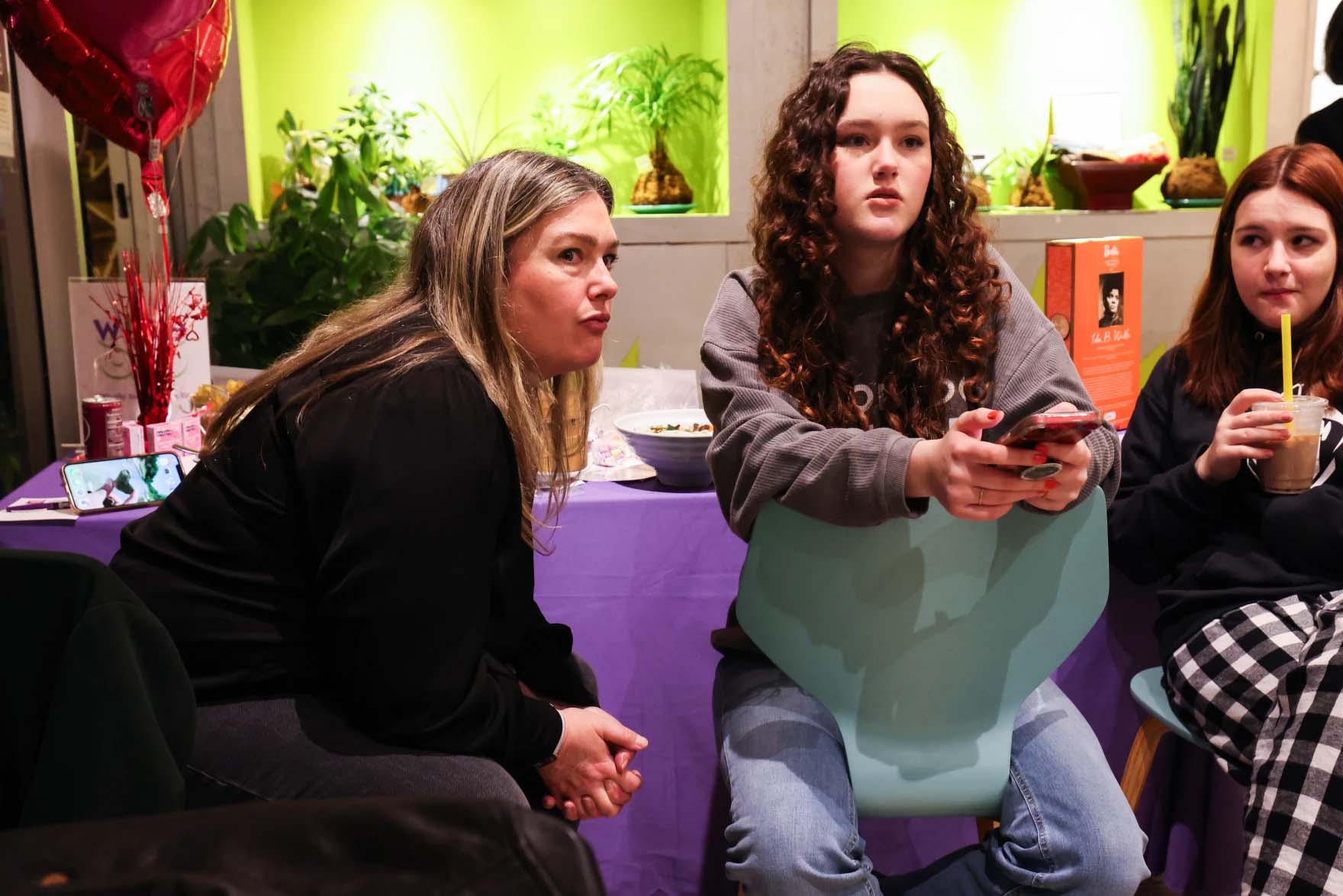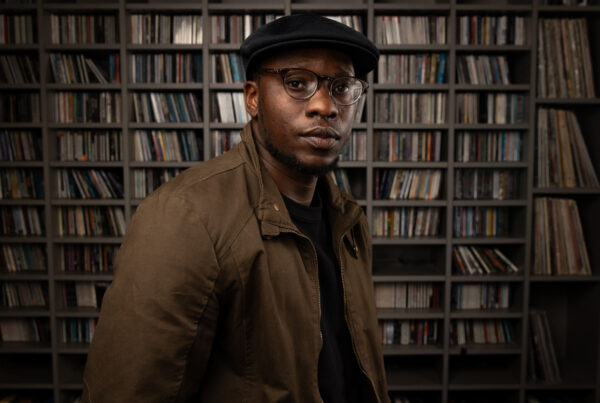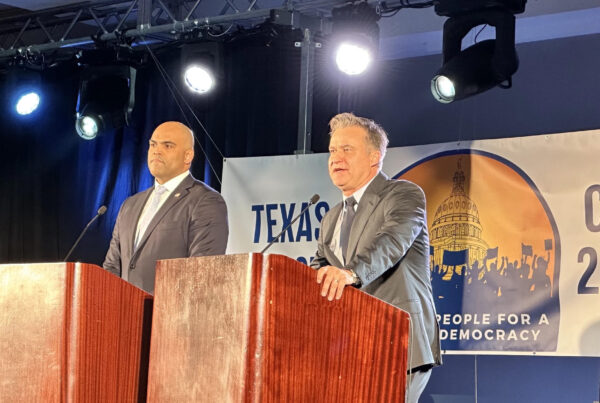From KERA News:
Two years ago, Texas students received updated health curriculum, including instruction on human sexuality, across all grade levels. It was the first time since the 1990s the Texas State Board of Education updated the learning goals for school districts.
But the new curriculum did not include information on consent, gender or sexuality. Lawmakers also made the instruction opt-in, meaning parents and caregivers have to sign a permission slip so students can receive this information.
According to the U.S. Centers for Disease Control and Prevention (CDC), Texas ranked in the top 20 states with high rates of chlamydia and gonorrhea in 2022. Texas is also in the top 10 states for teen birth, and had the second-highest rate of repeat teen births in the country in 2021
Advocates say one way to improve these outcomes would be prevention efforts, like sex education. But despite the update, they say things are worse than they were two years ago, and they’re concerned kids are missing crucial information.
“If we are able to provide this information in a preventative measure, we’re going to see better outcomes for all people,” said Alison Macklin, the director of policy and advocacy for national policy organization Sex Ed for Social Change (SEICUS).
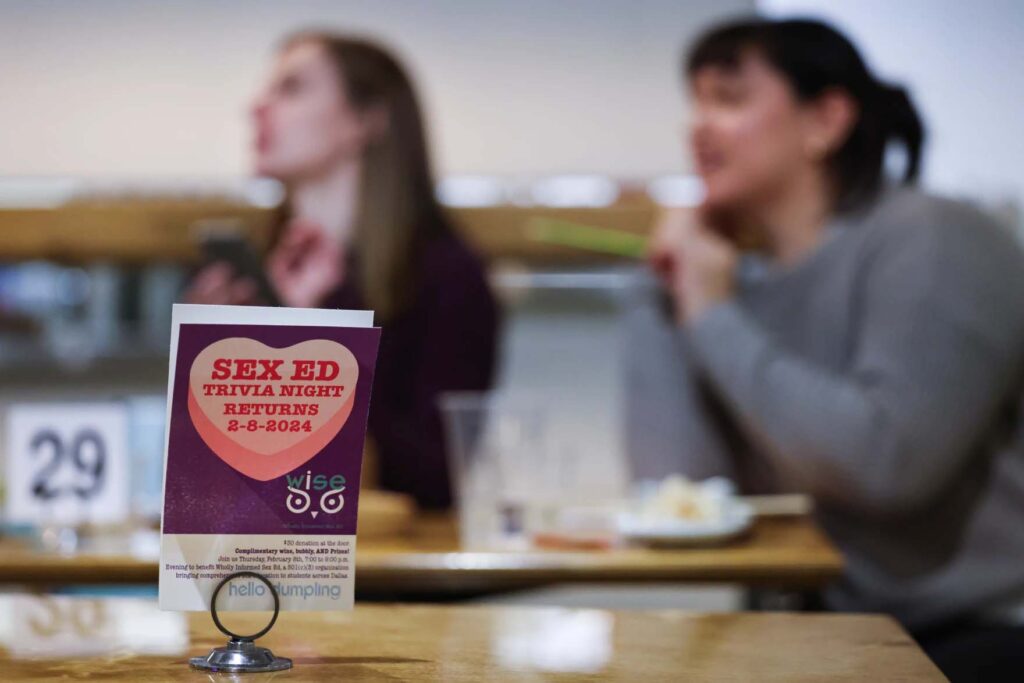
Participants decide on answers during Sex Ed Trivia Night on Thursday, Feb. 8, 2024, at Hello Dumpling in Dallas. The event benefits Wholly Informed Sex Ed, a nonprofit that advocates for comprehensive, medically accurate sex education.
Yfat Yossifor / KERA
Sex education in Texas
Health education in Texas is required in elementary school and middle school, but sex education is not required in high school.
According to the Texas Education Agency (TEA), elementary school students learn skills around five topic areas: physical health, mental health, and injury and violence prevention. Middle school and high school students learn about reproductive and sexual health, drug prevention and interpersonal violence.
The new curriculum standards implemented in 2022, called the Texas Essential Knowledge and Skills (TEKS) for Health Education, included information on puberty, contraceptives, sexually transmitted infections (STIs), and boundaries. These standards start in middle school and continue into high school.
Sex education in Texas is abstinence-first and does not have to be comprehensive or medically accurate. According to SEICUS, Texas “receives the highest amount of abstinence-only funding in the country” from federal programs through the U.S. Department of Health and Human Services.
“It’s very much about risk and risk avoidance,” said Sherri Cook, founder of Wholly Informed Sex Ed (WISE), a Dallas-based organization providing whole-health sex education instruction. “It’s all about pushing away other people and not trusting. There’s very little in there about learning how to be a healthy person in relationship with other people.”
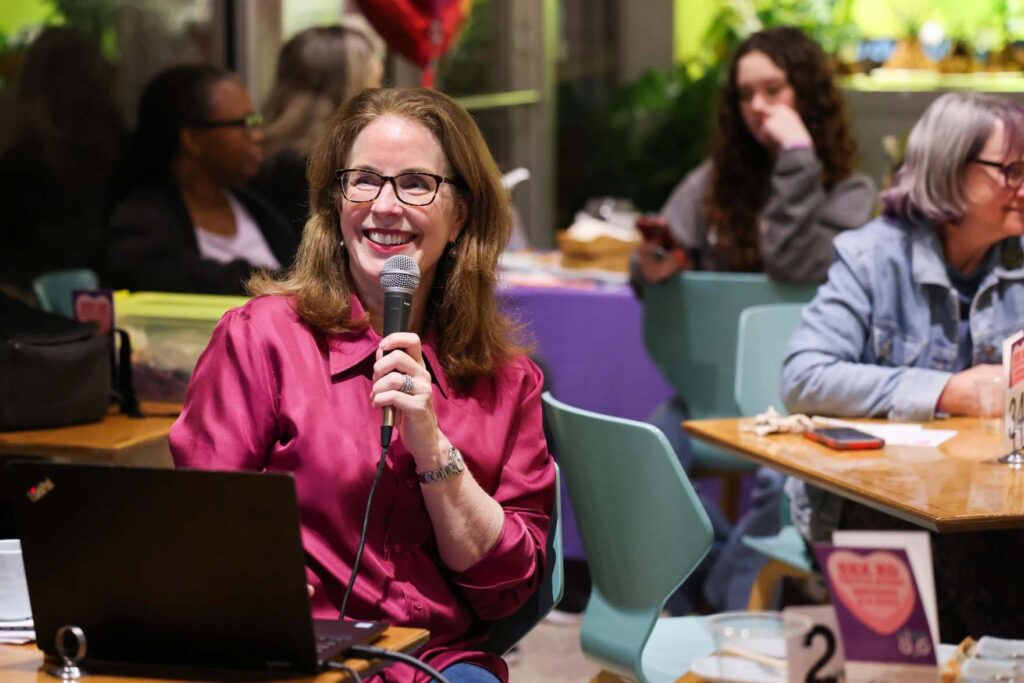
Sherri Cook with Wholly Informed Sex Ed reads out a question for Sex Ed Trivia Night on Thursday, Feb. 8, 2024, at Hello Dumpling in Dallas.
Yfat Yossifor / KERA
Decades of research show abstinence-only and abstinence-first programs have “little demonstrated efficacy in helping adolescents to delay intercourse,” often have “medical inaccuracies” and participate in the “unethical practice of withholding and distorting health information.”
Texas is also one of five states that has an opt-in policy for sex education, and the only state with an opt-in policy for abuse prevention education, which includes child abuse, dating violence and sex trafficking. The state previously had an opt-out policy, which allowed for parents and guardians to exempt their students from sex education.
But now, parents and guardians must sign a permission slip to allow students to participate, which advocates flagged as a barrier to access for vulnerable kids.
“The big concern with the opt-in policy is that some kids will just slip through the cracks,” Jen Biundo with Healthy Futures of Texas told KERA in 2022. “Maybe they’re not living with a parent or guardian, or maybe they don’t have a parent or guardian who’s closely engaged. Those might be the kids that need this information the most.”
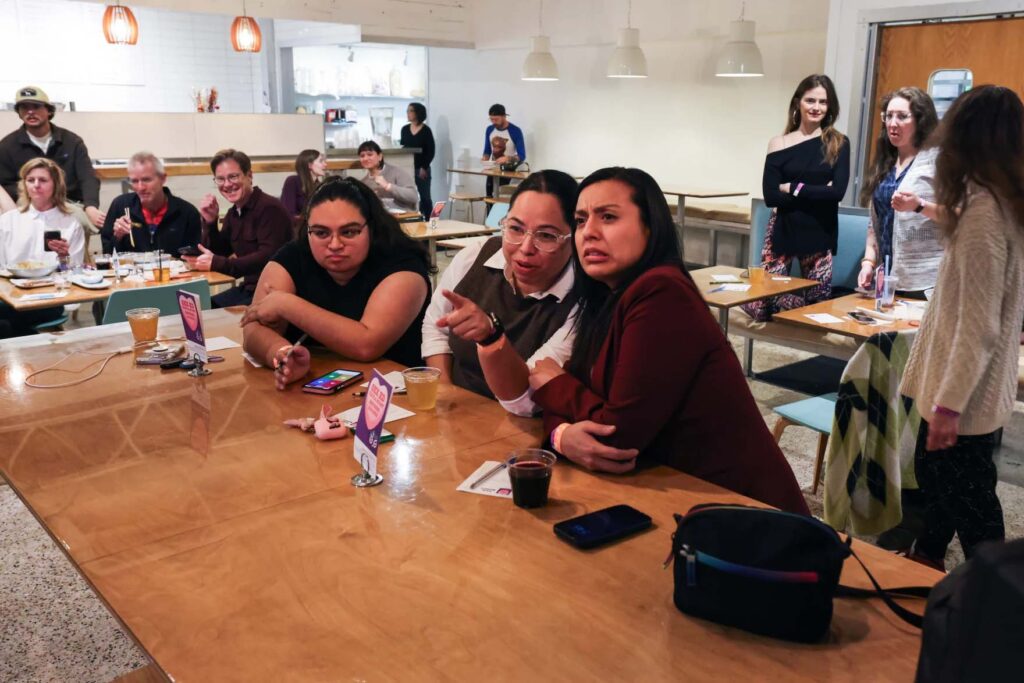
Teams of participants decide on answers during Sex Ed Trivia Night Thursday, Feb. 8, 2024, at Hello Dumpling in Dallas. The event benefits Wholly Informed Sex Ed, a nonprofit that advocates for comprehensive, medically accurate sex education.
Yfat Yossifor / KERA
Sex education as a health prevention tool
According to the American Academy of Pediatrics (AAP), comprehensive sex education helps “in reducing rates of sexual activity, sexual risk behaviors, STIs, and adolescent pregnancy and delaying sexual activity.”
Comprehensive sex education, said the AAP, includes evidence-based, medically accurate curriculum that provides information on human development, relationships, sexual behavior, sexual health and society and culture.
Raul Rojas, the director of community health education for Planned Parenthood of Greater Texas, said when sex education is taught in Texas, it’s “archaic.”
“It’s taught from a very heteronormative perspective of boys and girls engaging in risky behaviors, and not wanting the result of those behaviors to be a pregnancy,” he said. “It’s missing the piece that talks to you as an individual.”
That includes spaces for self-reflection, said Rojas, about people’s values, identities, and self-esteem.
“Sex education should be taught so you can be healthier, happier, and a better person to those around you,” he said, “not only your community, but your colleagues and your friends as you’re growing.”

A team of participants playfully heckles another team after they won a round at Sex Ed Trivia Night on Thursday, Feb. 8, 2024, at Hello Dumpling in Dallas. The event benefits Wholly Informed Sex Ed, a nonprofit that advocates for comprehensive, medically accurate sex education.
Yfat Yossifor / KERA
But Rojas said without resources and support, young people are finding information from less credible sources, like friends, TV, and pornography. He said he and other sex education instructors spend a lot of time busting myths and correcting misinformation.
“Whenever we teach an anatomy and physiology portion, what’s really funny is a lot of folks will [say], ‘Oh, I didn’t know I had that body part,’ or ‘I didn’t know that about my body,’” said Rojas. “We had one class with a bunch of grandmothers, and we had a question about menopause. We talked about perimenopause side effects. And a lot of women who were in their 60s and 70s were like, ‘Oh, I didn’t even know that.’”
Texas lawmakers have also sought to limit kids’ access to information that could be considered “sexually explicit” or “sexually relevant,” from book bans to laws that would prohibit schools from providing “instruction, guidance, activities or programming regarding sexual orientation or gender identity.”
While Rojas thinks “any sex education is better than no sex education,” he said these limitations have “increased a lot of people’s negative perceptions of what sex education is.”
“I think some of the loudest voices are also some of the most scared perspectives when it comes to sex education,” Rojas said. “That’s not the reality of young people or the adults in Texas.”
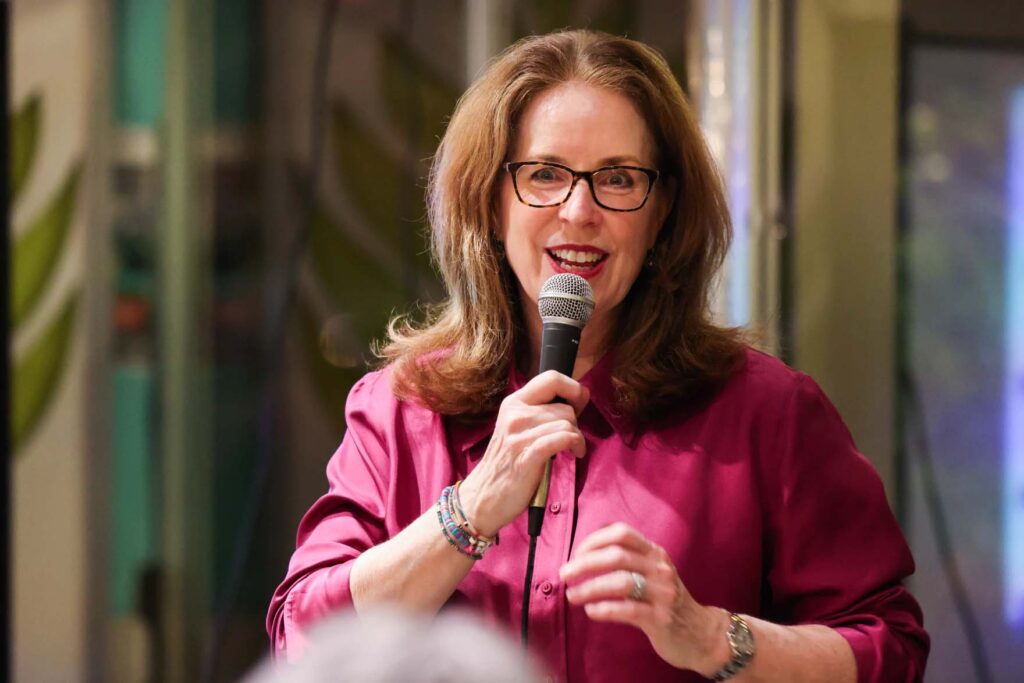
Sherri Cook with Wholly Informed Sex Ed welcomes participants to Sex Ed Trivia Night on Thursday, Feb. 8, 2024, at Hello Dumpling in Dallas.
Yfat Yossifor / KERA
Sex education outside of schools
Since sex education isn’t required in high school, and the state’s TEKS are limited in terms of instruction, some parents have looked for resources outside of school districts.
That’s what Sherri Cook did when she founded WISE in 2020.
“People love to point out the statistics in Texas, which many people are aware of: high teen pregnancy rates, repeat teen pregnancy rates, high rate of STI transmission, all those things,” Cook said. “They rarely talk about positive sexual health because it seems like everyone just wants to strike fear into your heart about what could go wrong. And so, we thought this would be a very meaningful contribution to the health of the Dallas community.”
WISE uses the Whole Lives Curriculum, said Cook, which is a secular curriculum that originated in the Unitarian Universalist Church.
Cook said it helps define sex education as “how we understand our bodies, and our relationships with ourselves and others.” The curriculum helps students answer the question, “What does it mean to be a human being in a body, in relationship with other people with bodies?”
It includes information on gender, sexuality, and race, but also discusses media literacy, communication skills, and affirmative connection.
Cook understands the pressure and constraints teachers are under—she was a classroom educator for 13 years. She said it’s “too heavy a lift for schools” to provide sex education instruction on top of everything else.
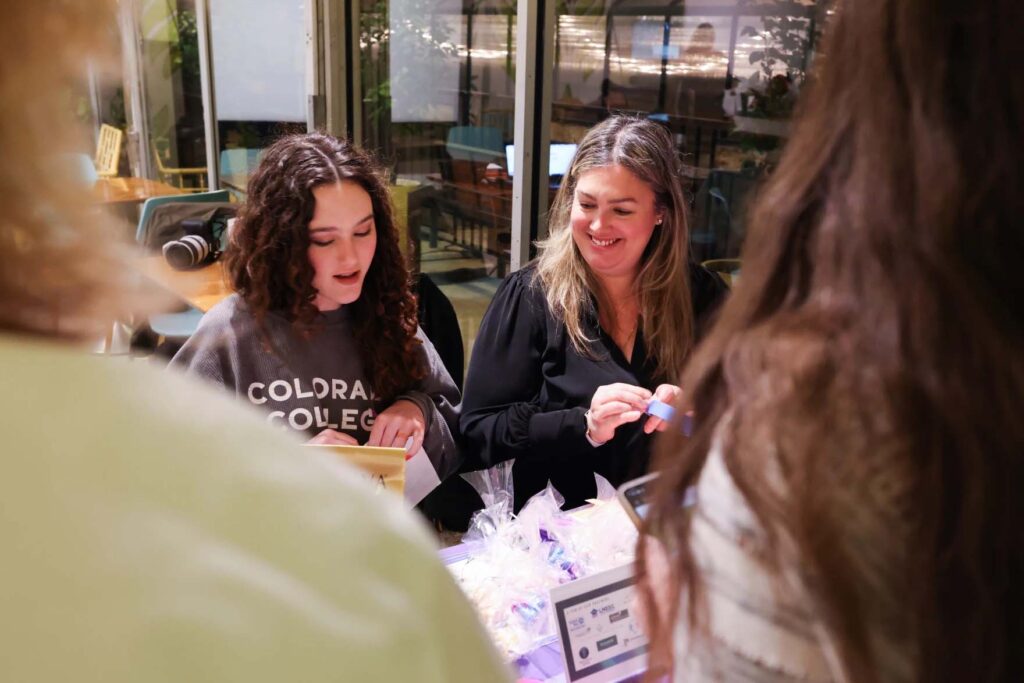
Isabella Good, right, and Emily Cabral check participants in for Sex Ed Trivia Night Thursday, Feb. 8, 2024, at Hello Dumpling in Dallas. The event benefits Wholly Informed Sex Ed, a nonprofit that advocates for comprehensive, medically accurate sex education for youth.
Yfat Yossifor / KERA
“What we need is more sex educators,” Cook said. “But it is a difficult environment. People are not just jumping up into this space and saying, ‘Oh, I can’t wait to teach sex ed in a state that doesn’t want me to even be there.’ So that’s hard.”
WISE has worked with community groups, summer programs and private schools to “meet students where they are,” but Cook said there’s been a “climate of fear we didn’t have in 2020.”
“A small part of the population in our state has basically hijacked the narrative around what constitutes healthy sexuality,” she said. “And in Texas, we’re promoting ideology over health. And good sex ed is based in science and not politics.”
Inclusive, comprehensive instruction was important to Emily Cabral, who learned about WISE when her daughter Isabella was in middle school. Cabral was grateful there was a space that went more in-depth.
“Just teaching someone about condom use is not going to change hearts and minds,” Cabral said. “If you have an educational program that’s focused on social skills, building self-awareness, building self-esteem…that is much more likely to result in behavior changes than just facts alone.”
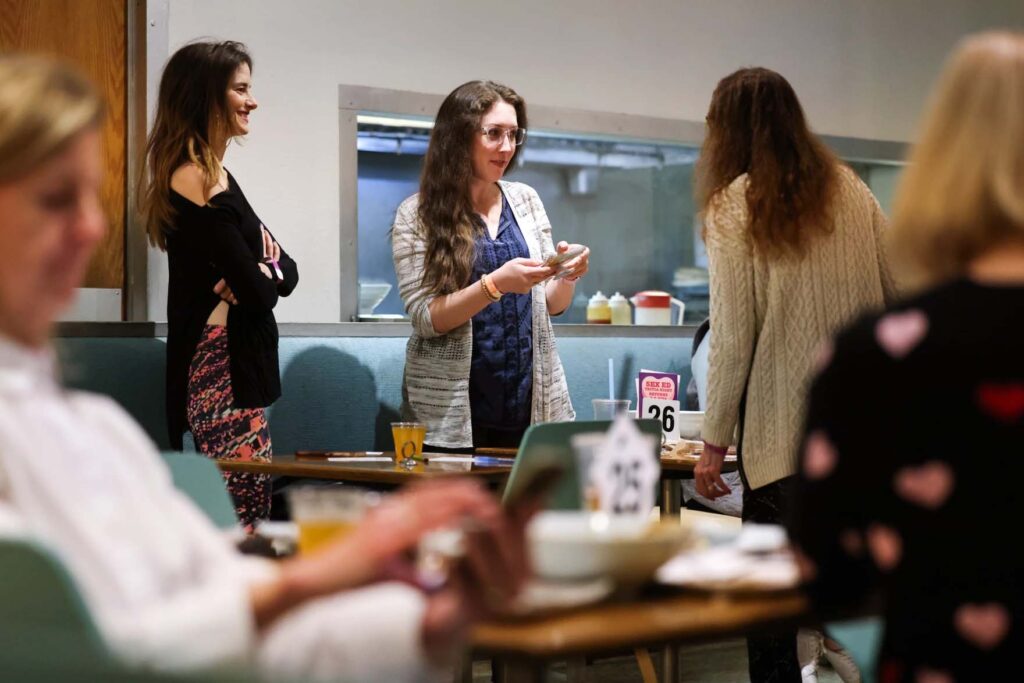
Participants decide on answers during Sex Ed Trivia Night on Thursday, Feb. 8, 2024, at Hello Dumpling in Dallas. The event benefits Wholly Informed Sex Ed, a nonprofit that advocates for comprehensive, medically accurate sex education.
Yfat Yossifor / KERA
It’s helped her learn more about sex education topics, like gender identity, alongside her daughter.
“I didn’t know as much about the vast array of different identities that we can inhabit,” Cabral said. “I just didn’t even know all of the terminology that was available.”
Isabella, who’s now 14 and a freshman in high school, said most kids just want to know, “Is this OK? Is this normal? Is this healthy? Am I normal?”
She said she feels “more equipped to make smart choices” with what she’s learned from WISE, along with what her parents have taught her. But she also just wants to be a teenager along with the rest of her friends.
“What we talk about during lunch is our teachers that are irritating us, or the math homework that we didn’t do last night,” Isabella said. “We’re not talking about sex and pregnancy. We do think about those issues, but it’s not our main focus in life, unless it has to be.”
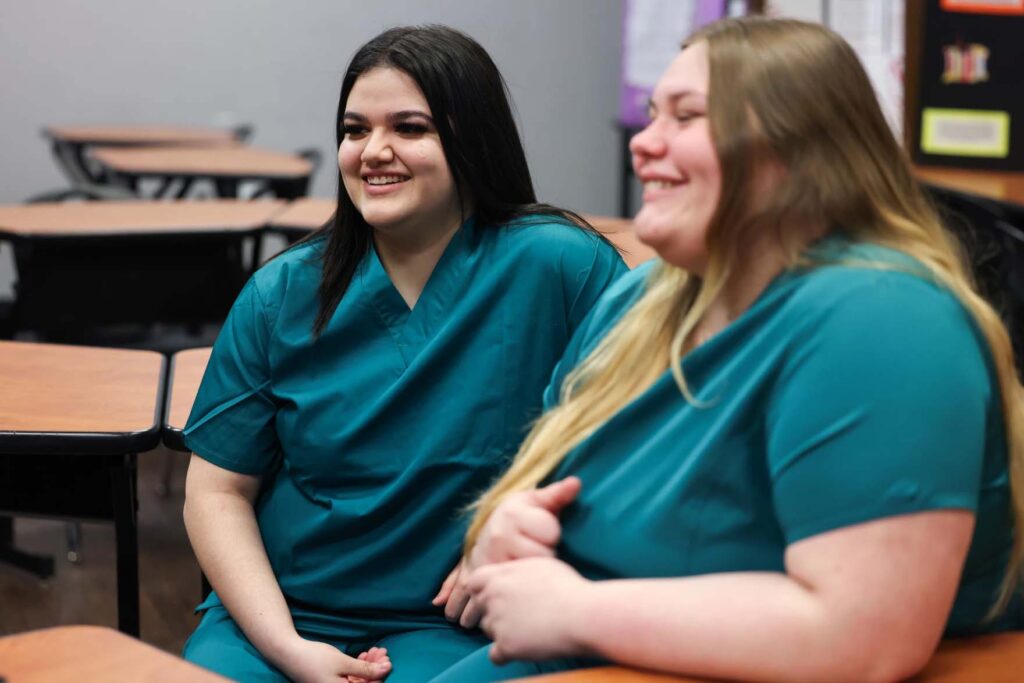
Amanda De Anda and Triniti Stone talk about putting on the health fair through the Community Health Worker certificate program Wednesday, Jan. 17, 2024, at Evolution Academy Charter School in Richardson.
Yfat Yossifor / KERA
Holistic health education as part of career training
Comprehensive health education is also helpful for students thinking of going into health professions, like Amanda De Anda, 17, and Triniti Stone, 16. They are both in the community health worker program at Evolution Academy Charter School in Richardson. Their cohort coordinated a community health fair last semester for students and adults.
The health fair included mental health and sexual health resources, like STI and HIV testing, in addition to blood pressure screenings and vaccinations.
“I think it is very good to learn about these resources, and just learn how to deal with these situations,” Stone said. “I think it’s very good for kids, especially our age, to learn more about their body and the mental side, why you should or should not be doing this right now, and why you should protect yourself and others.”
De Anda said the health fair was “only the beginning” of learning about how to connect people to support.
“When it comes to sex education, you want to know what to do to be protected,” she said.
Stone said learning more about health through the community health worker program has helped her “gain so much independence.”
“You can go and help people with the resources you obtained in this class,” Stone said. “And you can help the community. So, I think it definitely has given me just a lot more wisdom.”
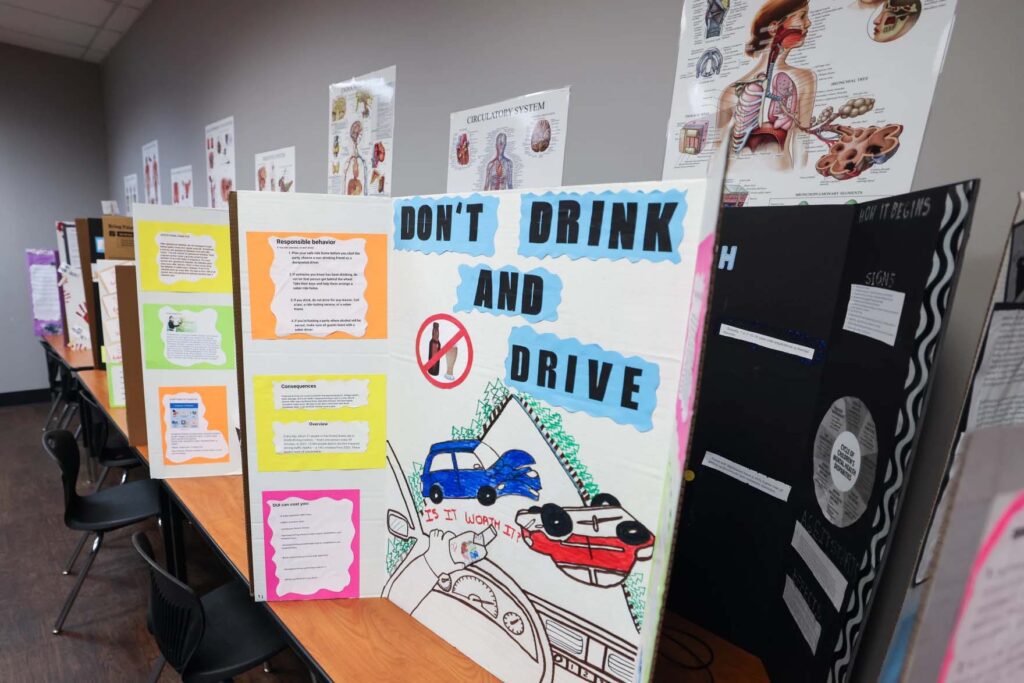
Students with the Community Health Worker certificate program created posters for a health fair at Evolution Academy Charter School in Richardson.
Yfat Yossifor / KERA
Texas sex education policy recommendations
Alison Macklin, the director of policy and advocacy with SEICUS, said Texas is at a “D-” in terms of sex education in comparison to other states, mostly due to the “unnecessary barrier” of the opt-in policy.
“I have kids,” she said. “Half the time, I don’t know what’s coming home, I don’t get the permission slips, I don’t always see what’s in their backpack. That’s a barrier, and so putting up barriers, all you’re doing is setting up a young person to be unsuccessful, and that’s not the goal of public education.”
Macklin also believes that school districts and teachers need more resources to implement sex education curriculum.
“We’ve got to invest in preventative services,” she said. “Education is a really ‘easy’ preventative education. And the other piece of that is lawmakers have to fund public schools, not only when it comes to sex education, but across the board.”
WISE executive director Sherri Cook said she encourages parents to be the “primary sexuality educators of their children.”
“We’ve had parents who actually thought their kids would be afraid of what we were bringing,” she said. “Kids are not afraid. What they are is curious, and they need to have answers to their questions, honestly and accurately given.”
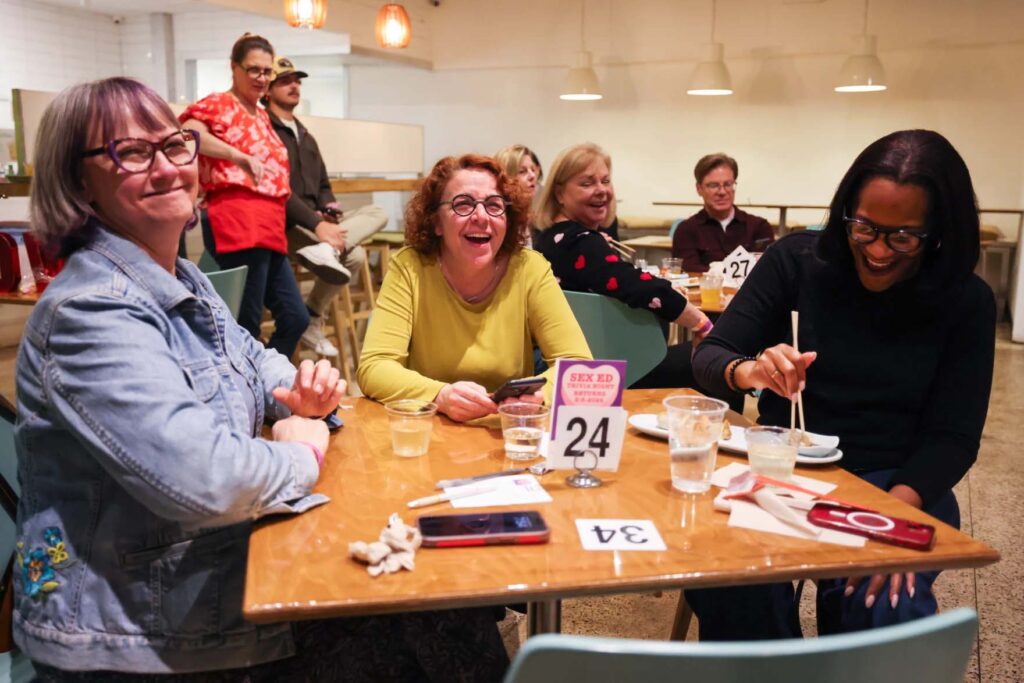
Participants laugh together during Sex Ed Trivia Night that benefits the nonprofit Wholly Informed Sex Ed on Thursday, Feb. 8, 2024, at Hello Dumpling in Dallas.
Yfat Yossifor / KERA
After Emily Cabral’s daughter went through WISE’s program, Cabral joined the organization to take a more active role in their work.
“A lot of questions we get are, ‘I really want to talk to my mom or I really want to talk to my dad about this, and I don’t know how to start the conversation,’” Cabral said. “I think parents are wanting that, too. But they’re not sure, they didn’t get sex ed when they were growing up. [It’s about] bridging that gap and helping people learn how to connect better in healthier ways.”
She hopes parents understand that sex education isn’t something that should be limited or dictated by people’s fears. Cabral said it’s ultimately about keeping kids safe now and as they grow up.
“I feel like the building’s on fire, and the firefighter is running to put out the flames” Cabral said. “And people are debating about what hose we’re using. And it’s like, we need to get water on this fire. Education is not the thing to be scared of, it’s the lack of education that I think is really putting people in danger.”
But, she said, until Texas lawmakers prioritize comprehensive sex education, it’s up to her, and parents like her, to find ways to fill in the gaps for their kids.


